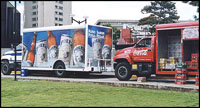 Industry Industry
 Fiscal incentives pave way for industry to recover Fiscal incentives pave way for industry to recover

"We have a country with a population of around 24 million people, we do not have enough internal consumption or demand to have large industrial projects, but we could develop them for export," says Vicente Brito , president of Venezuela's largest business chamber, Fedecameras.
"For the next three to five years we should target thirty billion dollars in investment. That will generate over a million and a half-new jobs in the country." Throughout the 1990s Venezuela's industrial base suffered a serious pounding as the effects of an over-valued currency, exchange controls, high inflation and investor wariness took its toll. Manufacturing in 1995 employed 500,000 people. In 2000 it barely scraped 200,000. Aware that Venezuela needs to diversify its economy away from pure petrodollars, the current administration is encouraging investments in certain industrial sectors by giving tax breaks to business and reworking the legal framework to ensure greater investor security.
In September 2000, the government decreed that small and medium-sized industries in economically depressed areas of Venezuela would be exempt from paying full income tax for the next eight and a half years.
Businesses with a turnover of less than $1.6 million a year and employ less than 50 workers are included in the exemption list. From 2003 these companies will enter into a sliding scale of tax payments handing over only 10% of the real figure.
Not included in the new law are the petroleum, mining and banking sectors.
Reenergizing dormant industry through state-financed industrial parks and an emphasis on local production has been one of the government's main economic platforms.
The outlying and under-populated states of Amazonas, Apure, Delta Amacuro, Sucre and Trujillo will see small and medium-sized industries exempted from income tax while 36 industrial parks across the country will also benefit from the measure.
In 2000 the government-funded small loans institute Foncrei arranged for a $125 million credit line to small business.
| 
"That oil, gas, aluminum, and iron are fine, but we have to take the competitive advantages that Venezuela has in these areas into more downstream manufacturing operations. We should not produce iron to export and then import an entire car, the transmissions or parts that could be made here in Venezuela. We should look to develop industry not only for the local market but multinational market," says Juan Calvo , president of Conindustria . Business leaders admit that small business has been sometimes slow to react to the demands of a globalized world. Cutting costs to the bone to compete with more savvy foreign operators and overcoming an innate disposition for imported goods has been a major challenge for many.
C.A.
Ron Santa Teresa , the nation's leading rum
producers faced just such a problem as bankruptcy
loomed in the mid-nineties due to a bloated pay
roll and soaring interest rates.
Through a restructuring program and slashing the pay roll by 50%, the company is now back on its feet and making a profit, according to its Business Manager Alberto Vollmer .
"When everything is becoming so global, controlled by multinationals, it is appealing to be an independent company," Vollmer says. Concentrating on a niche market in these times of the brand conscious consumer is definitely the way forward for Venezuela's national products.
"For exports, Venezuela should pick several products in different categories and focus on them. We want to concentrate on the high value markets, where the rum is at growth. With a strong base you can become strong internationally," Vollmer says.
Agriculture is one area where Venezuela hopes to boost production by focusing on certain crops. Currently agriculture makes up just 3% of GDP with Venezuela importing around 80% of its alimentary needs. President Chavez has earmarked cocoa, rice, soft fruits and coffee as so-called ‘flagship’ crops. Producers of these crops are set to receive extra funding from central government as well as technical support. "We have all the necessary prerequisites for agriculture," says Ronald Blanco , the governor of Tachira state , one of the largest coffee-producing states in Venezuela. "We have great agricultural possibilities with coffee and that is now set to continue." |

